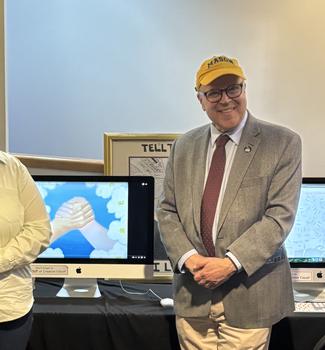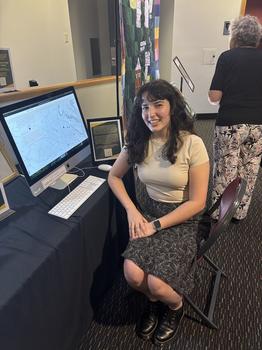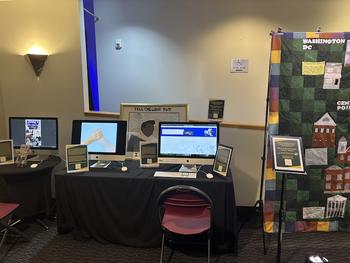Historical dramas may be nothing new to the theater, but an original opera based on a landmark Supreme Court Civil Rights case? Rick Davis knew this was something different.
After learning that Virginia Opera was planning to stage their new opera, Loving v. Virgina—based on the historic Supreme Court case striking down a Virginia law that banned interracial marriage—Davis seized the unique opportunity for his students.
The result was HNRS 360 Opera as Social Change, an Honors College course taught by Davis, the dean of George Mason University’s College of Visual and Performing Arts, that explored the role opera can play in presenting—and changing—a community’s shared history.
“I love bringing the arts together with other subjects because I want to get people from the community interested in the arts by meeting them at their personal interest—in this case, through opera,” said Davis. “I pitched the idea for the class to the Honors College, and they're always so wonderful about backing experimental course design ideas.”

“[In the class] we focused on the intersection of arts and politics,” said government and international politics major Kayla Goldschmidt.
“I’ve learned that opera is another way to tell important stories and it can make it more accessible to different populations. This course did such a great job of highlighting that,” she added.
The course, which took place in fall 2024, culminated in the students creating final projects that represented the court case as expressions of public dramaturgy, the connection of theater and stagecraft with contemporary society.
Goldschmidt used the system software ArcGIS to create an interactive story map using an assigned reading from the class: Race, Sex, and the Freedom to Marry by Peter Wallenstein. “I settled on this idea because I’m very passionate about geography and in the assigned reading, I felt that the geographical aspect was very present throughout the narrative,” said Goldschmidt.

“[The book] takes us to every location of the Loving story, so I tried to simulate that with my final project. It was so different from anything I had done for a final before in college,” she said.
For her final project, junior forensic science major Madison Dragon created a reference paper that spelled out “loving,” with each letter referencing other relevant court cases or people who were monumental in the Civil Rights movement.
“People can pick out a letter, and I provided a little blurb on what the letter represented, so it was more educational. I had the court cases written as the foundation for different themes, so one was on marriage law, for example,” said Dragon, who is currently obtaining her bachelor’s and master’s degrees through George Mason’s Bachelor’s to Accelerated Master’s program.
“Working in the CFA is actually how I met Rick. He knew of my love for the arts, so at one of the shows I was working, we talked about this course and I was immediately interested in joining,” said Dragon, who is the house manager at George Mason’s Center for the Arts.
“The goal of opera is to make you question what you know and whether you should be taking action. Referencing this historic court case in class was amazing because we’re still seeing similar issues in today's society,” Dragon said.
The course also featured guest speakers including George Mason faculty members LaNitra Berger, Wendi Manuel-Scott, Richard Leech, and Jennifer Casey Cabot.
Berger, director of George Mason’s African and African American Studies Program, talked about the historical background of the Loving case with the students. “We discussed the segregation laws prohibiting interracial contact and the price the Lovings paid for falling in love across racial lines and refusing to back down when they wanted to get married.”

“Unfortunately, I think that younger people, including our students, have real-world experience about what it looks like to discriminate against people for who they are,” Berger said.
Guest speakers from Virginia Opera included composer Damien Geter, librettist Jessica Murphy Moo, and conductor Adam Turner, as well as Gregory Spears and Kevin Newbury, the composer and director, respectively, of the opera Fellow Travelers, staged by the company in 2023.
When Loving v. Virginia was performed in the Center for the Arts on May 3-4, the students’ final projects were on display in the Concert Hall. Read more about the world premiere opera performance here.
In This Story
